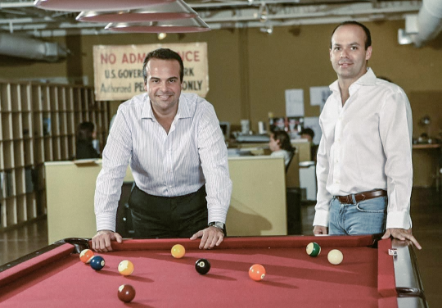5 People Who Left Corporate America…and Became Smashing Successes
If you think that athletes are athletes and executives are executives, and never the twain shall meet, think again. There are quite a few CEOs and high-powered corporate types who have gone on to become super successful. And athletics isn’t the only field where these diamonds in the rough turn up. Here are five people who became wild successes after leaving corporate America.
Evelyn Stevens, the “Wall Street Cyclist”
Not so long ago, Evelyn Stevens was a young, successful mid-level executive at the investment firm of Gleacher Mezzanine (now Arrowhead Mezzanine). She had a penchant for cycling, but no one knew just how potent that urge could be, or where it would take her. She, like most executives who work 50+ hours a week, could only sneak in a little exercise here and there.
When she bought a bike, all that changed. One year, after visiting family in northern California, she decided to try her hand at cross country cycling.
She did not win, but that wasn’t the point. From then on, her path was set. Evelyn, as it turns out, is gifted with athletic genes, and they gave her a leg up in all the subsequent races she participated in, as well as the tests she undertook in order to find just what it was that made her such a superior cyclist.
Thanks to that innate skill, and her competitive drive, she is now one of the top female cyclists in the world. She’s no Olympian, but with hard work, she could easily get there.
Jorge Plasencia, CEO of República Ad Agency
Everyone has to start somewhere. Jorge Plasencia was no different. At the tender age of 14, he started out working for the Promotions department of a Miami-based, Spanish-language radio station. His savvy and intelligence quickly saw him move up the station ladder. Later on, he became the Director of Hispanic Marketing for the Florida Marlins Baseball Club. The team enjoyed great (and more importantly measurable) success and a broad level of appeal within the Spanish-speaking community of Miami. This was thanks primarily to Plasencia’s implementation of numerous marketing programs and turnkey sales that allowed the team to develop a loyal following in the Spanish community.
Following his time with the Marlins, Jorge worked for ’80s music sensation Gloria Estefan and her husband, marketing mogul Emilio Estefan Jr. With the Estefans, he was Vice President of Estefan Enterprises Inc., which was a global company devoted to ventures in the the hospitality, media and entertainment industries. Not only was he responsible for corporate development and publicity, he helped manage the day-to-day business affairs of artists like Gloria herself, as well as Latin sensation Shakira.
Then, after a stint with Univision Radio, where he served as the Corporate Vice President and Operating Manager, he formed his own company, República. And it is República which is perhaps his greatest legacy. The branding, advertising and communications company, which prides itself in its ability to provide a far-reaching assortment of information and knowledge to the Spanish-speaking communities of south Florida, boasts Burger King, the aforementioned Marlins and local grocery chain, Sedano’s Supermarkets as clients, among others.
Scott Belsky, CEO of Behance
Formerly of New York City-based investment giant, Goldman Sachs, Scott Belsky was just an associate with a promising career. But he wanted more, so he left Sachs to attend Harvard Business School. It was there that he developed the idea that would eventually become Behance.
But what is Behance? It is a site that lets artists from almost every medium, market and sell their work, as well as seek out job opportunities/commissions. But unlike other sites, like DeviantArt, which is primarily focused on the showcasing of art rather than the marketability of it, Behance is a small company with a long reach. In his work with Behance, Scott has brought together appreciators of art, the artists themselves, investors as well as potential employers of the artists whose portfolios his site helps create.
Belsky is also the founder of The 99% (which takes its name from Edison’s quote, “Genius is 1% inspiration, 99% perspiration”). The 99% is a Behance think tank that is constantly coming up with new and innovative ideas about how to market Behance’s ever expanding roster of artists and clients, to get them out there, and make them, and by extension Behance itself, more visible.
Kweise Mfume, Former CEO for the NAACP
Born Frizzell Gray on October 24, 1948, the man who would eventually become CEO of the National Association for the Advancement of Colored People (NAACP) lived an interesting life. At one point, after dropping out of high school, he worked three jobs to help support his family. But it was also around this time that he fell on the wrong side of the law. (What he did, or even ‘if’ he did anything is open to debate. He contends that he was picked up simply because he was young and black – or as is commonly referred to in the Black community as “driving while black” or “fitting the description.”)
During his teen years Frizzell also fathered five children. However, after turning 23, he returned to school, got his GED and promised himself that he would never return to that life again. And so he didn’t.
In the early 1970s, Frizzell adopted the name Kweise Mfume at his aunt’s behest, in an attempt to draw closer to his roots. While it translates to ‘conquering son of kings,’ one can forgive Mfume for such an ostentatious-sounding name. Given his achievements since turning his life around, his name seems quite fitting.
He would go on to earn a Bachelor’s degree from Morgan State University and a Master’s of Liberal Arts degree from John Hopkins University. Mfume served several terms in Congress and the Senate, then in 1996 was elected the CEO of the NAACP, where he would serve from 1996 to 2004.
Juliet Huck, CEO, TheHuckGroup
For those who have served as jurists in high profile cases involving lots of exhibits and pictures, you may have seen some of Huck’s work, or work from one of her employees. She once worked out of a Los Angeles-based litigation support company as the art director. What this meant was that she provided renderings and sketches to the court based on the needs of a particular case. However, she thought she could do better. Unfortunately, her superiors at the time didn’t think it was what was wanted, so they shot her down.
That did not dissuade her. Far from it. She took her savings, which amounted to about $11,000 or so, and drafted up a business plan. She wanted to be able to provide top quality, engaging litigation-centric art, and this was her golden ticket, as it were. Still, the business did not come easy. Even after securing a loan, and networking, it took her three months to nail down her first customer. Said customer was a law firm that paid her $20,000 per month for five months in order to keep her on retainer. In the years that followed, she developed a reputation for excellence and has expanded her efforts. She now has roughly nine employees, working in offices in the cities of L.A., Chicago, and Ormond Beach, Florida.
SOURCE: Business Pundit































